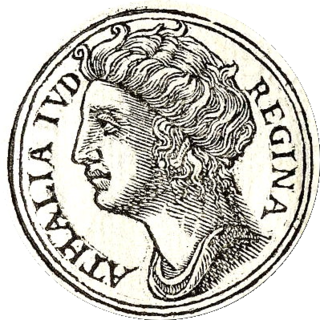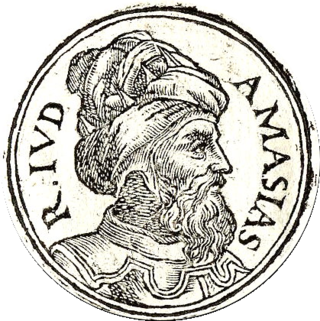Related Research Articles

Jehu was the tenth king of the northern Kingdom of Israel since Jeroboam I, noted for exterminating the house of Ahab. He was the son of Jehoshaphat, grandson of Nimshi, and possibly great-grandson of Omri, although the latter notion is not supported by the biblical text. His reign lasted 28 years.
Ramoth-Gilead, was a Levitical city and city of refuge east of the Jordan River in the Hebrew Bible, also called "Ramoth in Gilead" or "Ramoth Galaad" in the Douay–Rheims Bible. It was located in the tribal territorial allotment of the tribe of Gad.
Jehonadab was the son of Rechab. He is mentioned in 2 Kings 10:15-31. A Kenite, he was a supporter of Jehu, son of Nimshi, in the elimination of the house of Ahab and in suppressing worship of Baal throughout Samaria. Jehu seeks his support at a meeting in the desert and assures Jehonadab of his "zeal for the Lord".

Athaliah was the daughter of either king Omri, or of King Ahab and Queen Jezebel of Israel, the queen consort of Judah as the wife of King Jehoram, a descendant of King David, and later queen regnant c. 841–835 BCE.

Ahaziah of Judah or Jehoahaz I, was the sixth king of Judah, and the son of Jehoram and Athaliah, the daughter of king Ahab of Israel. He was also the first Judahite king to be descended from both the House of David and the House of Omri, through his mother and successor, Athaliah.

Amaziah of Judah, was the ninth king of Judah and the son and successor of Joash. His mother was Jehoaddan and his son was Uzziah. He took the throne at the age of 25, after the assassination of his father, and reigned for 29 years,, 24 years of which were with the co-regency of his son. The second Book of Kings and the second Book of Chronicles in the Hebrew Bible consider him a righteous king, but with some hesitation. He is praised for killing the assassins of his father only and sparing their children, as dictated by the Mosaic Law.
The non-canonical books referenced in the Bible includes non-Biblical cultures, and lost works of known or unknown status. By the "Bible" is meant those books recognized by most Christians and Jews as being part of Old Testament as well as those recognized by some Christians as being part of the Biblical apocrypha or of the Deuterocanon.
Shulmanu or Shulman was an ancient Mesopotamian deity. The deity is only ever recorded as having been worshipped by the ancient Assyrians, in contrast to many other deities of the Mesopotamian pantheon which were more universal, and was particularly popular in the Middle Assyrian period. The deity's name was incorporated into the name Shalmaneser, assumed as a regnal name by five Assyrian kings from Shalmaneser I to Shalmaneser V. The literal translation of the name Salmānu is "friendly one"; it is possible that Shulmanu was a friendly manifestation of the Assyrian national deity Ashur.
Shaphat of Abel-meholah: a man in the Bible, father of Elisha.
And Jehu the son of Nimshi shalt thou anoint to be king over Israel: and Elisha the son of Shaphat of Abelmeholah shalt thou anoint to be prophet in thy room.
And it shall come to pass, that him that escapeth the sword of Hazael shall Jehu slay: and him that escapeth from the sword of Jehu shall Elisha slay. Yet I have left me seven thousand in Israel, all the knees which have not bowed unto Baal, and every mouth which hath not kissed him.
So he departed thence, and found Elisha the son of Shaphat, who was plowing with twelve yoke of oxen before him, and he with the twelfth: and Elijah passed by him, and cast his mantle upon him.

Jehu son of Hanani was a prophet mentioned in the Hebrew Bible, who was active during the 9th century BC.
Nimshi is a character in the Hebrew Bible. He is mentioned in the Books of Kings and the Second Book of Chronicles as father, grandfather, or possibly a forebear of Jehu, the king of the Northern Kingdom of Israel.
The House of Jehu or Jehu dynasty was a reigning dynasty of the Kingdom of Israel. They are depicted in both of the Books of Kings. Their estimated reign is placed from the 9th century to the 8th century BCE.

2 Kings 9 is the ninth chapter of the second part of the Books of Kings in the Hebrew Bible or the Second Book of Kings in the Old Testament of the Christian Bible. The book is a compilation of various annals recording the acts of the kings of Israel and Judah by a Deuteronomic compiler in the seventh century BCE, with a supplement added in the sixth century BCE. This chapter records Jehu's anointing as the next king of Israel and his assassinations of Jehoram the king of Israel, Ahaziah the king of Judah and Jezebel the queen mother of Israel. The narrative is a part of a major section 2 Kings 9:1–15:12 covering the period of Jehu's dynasty.

2 Kings 10 is the tenth chapter of the second part of the Books of Kings in the Hebrew Bible or the Second Book of Kings in the Old Testament of the Christian Bible. The book is a compilation of various annals recording the acts of the kings of Israel and Judah by a Deuteronomic compiler in the seventh century BCE, with a supplement added in the sixth century BCE. This chapter records Jehu's massacres of the sons of Ahab, the kinsmen of Ahaziah the king of Judah and the Baal worshippers linked to Jezebel. The narrative is a part of a major section 2 Kings 9:1–15:12 covering the period of Jehu's dynasty.

2 Kings 15 is the fifteenth chapter of the second part of the Books of Kings in the Hebrew Bible or the Second Book of Kings in the Old Testament of the Christian Bible. The book is a compilation of various annals recording the acts of the kings of Israel and Judah by a Deuteronomic compiler in the seventh century BCE, with a supplement added in the sixth century BCE. This chapter records the events during the reigns of Azariah (Uzziah) and his son, Jotham, the kings of Judah, as well as of Zechariah, Shallum, Menahem, Pekahiah and Pekah, the kings of Israel. Twelve first verses of the narrative belong to a major section 2 Kings 9:1–15:12 covering the period of Jehu's dynasty.

2 Kings 11 is the eleventh chapter of the second part of the Books of Kings in the Hebrew Bible or the Second Book of Kings in the Old Testament of the Christian Bible. The book is a compilation of various annals recording the acts of the kings of Israel and Judah by a Deuteronomic compiler in the seventh century BCE, with a supplement added in the sixth century BCE. This chapter records the reign of Athaliah and Joash as the rulers of Judah.

2 Kings 12 is the twelfth chapter of the second part of the Books of Kings in the Hebrew Bible or the Second Book of Kings in the Old Testament of the Christian Bible. The book is a compilation of various annals recording the acts of the kings of Israel and Judah by a Deuteronomic compiler in the seventh century BCE, with a supplement added in the sixth century BCE. This chapter records the reign of Joash as the king of Judah.

2 Chronicles 20 is the twentieth chapter of the Second Book of Chronicles the Old Testament in the Christian Bible or of the second part of the Books of Chronicles in the Hebrew Bible. The book is compiled from older sources by an unknown person or group, designated by modern scholars as "the Chronicler", and had the final shape established in late fifth or fourth century BCE. This chapter belongs to the section focusing on the kingdom of Judah until its destruction by the Babylonians under Nebuchadnezzar and the beginning of restoration under Cyrus the Great of Persia. The focus of this chapter is the reign of Jehoshaphat, king of Judah.

2 Chronicles 22 is the twenty-second chapter of the Second Book of Chronicles the Old Testament in the Christian Bible or of the second part of the Books of Chronicles in the Hebrew Bible. The book is compiled from older sources by an unknown person or group, designated by modern scholars as "the Chronicler", and had the final shape established in late fifth or fourth century BCE. This chapter belongs to the section focusing on the kingdom of Judah until its destruction by the Babylonians under Nebuchadnezzar and the beginning of restoration under Cyrus the Great of Persia. The focus of this chapter is the reigns of Ahaziah and Athaliah, rulers of Judah.

1 Kings 16 is the sixteenth chapter of the Books of Kings in the Hebrew Bible or the First Book of Kings in the Old Testament of the Christian Bible. The book is a compilation of various annals recording the acts of the kings of Israel and Judah by a Deuteronomic compiler in the seventh century BCE, with a supplement added in the sixth century BCE. 1 Kings 12:1-16:14 documents the consolidation of the kingdoms of northern Israel and Judah. This chapter focusses on the reigns of Baasha, Elah, Zimri, Omri and Ahab in the northern kingdom during the reign of Asa in the southern kingdom.
References
- ↑ 1 Kings 19:16, 2 Kings 9:2, 2 Kings 9:20 and 2 Chronicles 22:7.
- ↑ Baruchi-Unna, Amitai (September 2017). "Jehuites, Ahabites, and Omrides: Blood Kinship and Bloodshed". Journal for the Study of the Old Testament . 42 (1). doi:10.1177/0309089216661177. S2CID 159833033.